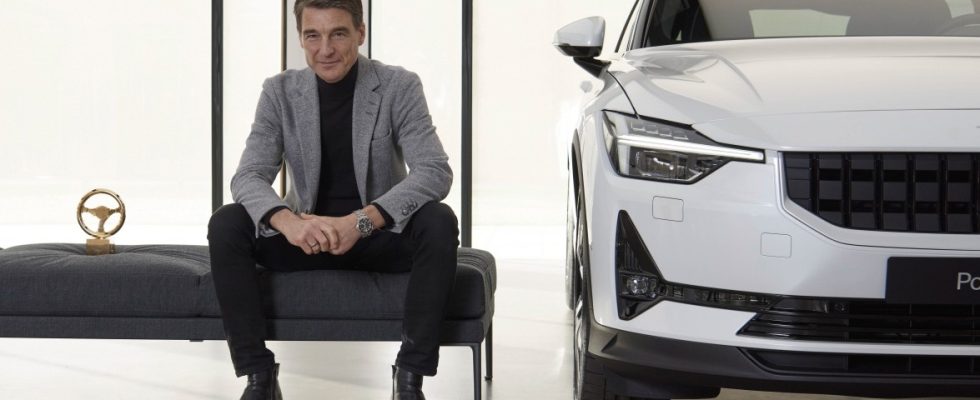The electric car manufacturer Polestar does not have a stand at this year’s IAA. Not necessary, says company boss Thomas Ingenlath, after all they have had a showroom in downtown Munich for a long time. And the brand, which, together with Volvo, belongs to the Chinese car manufacturer Geely, has already achieved what other car manufacturers from the People’s Republic are only just beginning to do: establish themselves on the European market. Thomas Ingenlath knows many perspectives on the automotive world – before he started at the Swedish-Chinese joint venture, the 59-year-old was chief designer at various brands in the VW Group and at Volvo.
SZ: What is your view of China and German manufacturers?
Thomas Ingenlath: Until now, people have only ever seen this as “the danger from the east”. It is finally being recognized what excellent technology, what great innovations and what dynamism there is. Yes, the support from the Chinese government also plays a role. But in many places it is still a completely natural competition, which often comes from privately operated companies. Especially BYD, what a story! They have simply done their homework in terms of technology and are very well positioned.
Can the Germans still catch up?
Establishing yourself on the European market is something else. This will take a while. European engineering must reflect on itself again, politics must finally take a consistent path, and companies must clearly commit to electromobility. Digitalization is also an essential element. We don’t even need to look at China. I know from my own experience how the digitalization of everyday life is so omnipresent in Sweden, for example, and makes life easier. If I come to Germany and have difficulty paying with a credit card in a taxi – that’s a big problem.
They, on the other hand, overdo it when it comes to digitalization – at least many found it critical that Polestar integrated Google’s operating system.
Back then it was said that we were going to bed with the devil. But our customers are enthusiastic and we have managed to always be up to date. You shouldn’t always be afraid of everything.
Polestar is owned by Geely, a Chinese company. But here in Germany you are perceived more as a sister brand to Volvo. Does that help?
We are at home in Gothenburg, we are European. Our engineers are based in the UK. It’s clear that the owner is Chinese. But the product is European from A to Z. By the way, this is also how we are perceived in China, which is actually a problem there.
In what way?
When it comes to a European electric car, the Chinese now say with great pride: You’re just behind when it comes to software. That’s why we have now entered into a joint venture in China with a large smartphone manufacturer. Together with them we create our own software for the Chinese car market. I think that is the path that many European car manufacturers also have to take.
Volvo also builds electric cars. How do you manage not to cannibalize yourself?
We position ourselves as a premium brand. But we also have to be different where Volvo is present. For example, we offer an SUV in the same segment as Volvo. But our cars are sportier, we are more likely to compete with a Porsche Cayenne. Volvo has more of an inclusive orientation that would never offend anyone. Polestar is more accentuated. We are more exclusive. We have a suspension setup that is clearly driver-oriented and not aimed at the children in the second row. You would never do something like that at Volvo. Our customers should calmly say: I bought the car for myself – even if other people can also take a ride.
Who do you see as your customer?
Very innovative people. And our customers are aware of what modern mobility means, that the fun you have with your car does not come at the expense of the environment. Our customers know everything about green electricity and charging; they are experts.
What do you have to offer them?
Efficiency is what matters, not how many kilowatt hours I can pack into a car. At a certain point it becomes questionable why I even have so much reach. It’s more about the charging speed and that I have enough charging stations that are available when I need them.
How do you see the discussion about Germany as an industrial location?
Sometimes things just have to get really tough so that you develop the strength and energy to reorient yourself. The problem I see in Germany is a certain schizophrenia. Firstly, to worry. On the other hand, there are always doubts about whether electromobility is the right path. But in Germany the combustion engine lobby is still not letting up.
Are you referring to the discussion about whether we could save the combustion engine with e-fuels?
Yes, and openness to technology or whatever else is being put forward. My God, we should be beyond this discussion long ago. Of course, electromobility is the future, and of course we can continue to reduce CO2 in production from there. Instead, we are still discussing the end of the combustion engine? Germany is really a very special market.
These doubts also come again and again from the auto industry, most recently from BMW boss Oliver Zipse.
I’m trying to get a diplomatic answer. How can you still show this ambivalence to the outside world? I don’t understand. This is also fatal for customers. I have to offer guidance. And give people who buy a car for 70,000 euros the certainty that this is the right technology decision. How do I want to convince them of this if I say myself: Yes, but maybe. I just miss real leadership.

